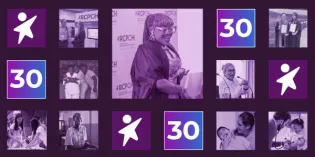
Start year of presidency: 2000
End year of presidency: 2003
Year James Spence Medal awarded: 2004
David Hall’s pre-clinical training was at King’s College, London, where he met his future wife, Susan, in the pharmacology lab; and his clinical training was at St George’s Hospital. He was awarded the University of London Gold Medal and was appointed house physician to Dr Peter Baker at Mayday Hospital in Croydon.
David and Susan spent a year as interns in Canada, where rotations through the Charles Janeway Children’s Hospital determined his choice of career. On return to the UK, he worked in paediatric audiology at the Royal National Throat Nose and Ear Hospital, followed by an SHO appointment at the Queen Elizabeth Hospital in Hackney. In 1973 he and his wife took up a three year contract at the Baragwanath Hospital in Johannesburg.
At Baragwanath, in addition to paediatrics and neonatology, he spent six months in paediatric neurology, and this stimulated his interest in childhood disability. On return to the UK he was appointed senior registrar in child development to Dr Hugh Jolly, at Charing Cross Hospital. Many patients were referred from child health clinics with a diagnosis of developmental language disorder, developmental dyspraxia or autism. The diagnostic criteria were imprecise and David began to question the value of screening. Susan studied vision screening in child health clinics for her Master’s thesis in epidemiology and together they published a paper on infant vision screening. Subsequently she co-founded the British Paediatric Surveillance Unit, and they collaborated closely throughout their careers.
In 1978, David was appointed consultant paediatrician at St George’s Hospital with responsibility for children with disabilities. He was also involved in several voluntary organisations, including Contact A family, AFASIC and the Spastics Society (now SCOPE). His book, The Child with a Handicap (1984) was updated in 1996 with co-author Peter Hill as The Child with a Disability.
In 1985 he published with Dr Gillian Baird a paper on the role of primary care in identifying developmental problems and in 1986 was invited by the British Paediatric Association to chair a Joint Working Party on Child Health Surveillance, whose membership include representatives from general practice, public health, health visiting and community paediatrics. The working party reviewed the evidence for the preventive, screening and health promotion procedures carried out in child health clinics. The report “Health for all children” (1989) noted the paucity of evidence on the natural history of developmental problems and the reliability of screening tests. A core set of activities was proposed and the need for further research was emphasised.
“Health for all children” was one of the first attempts to apply an objective evidence based approach to medical practice. It stimulated a lively and sometimes acrimonious debate not only in the UK but also in the USA, Scandinavia and Australia. With colleagues David also published a practical guide, the Child Surveillance Handbook, now in its third edition.
In 1993 David moved to Sheffield as professor of community paediatrics. To update “Health for all children” over the next ten years, he consulted and challenged many experts and parent representatives in topics such as hearing and vision impairment, growth disorders, developmental disabilities and biochemical screening. Research in these areas expanded rapidly. From 1996 he chaired the child health division of the National Screening Committee, which had the support of the Department of Health and of Ministers. He argued that the benefits of developmental screening were at best modest, but strongly supported investment in early child development and was involved with the implementation and evaluation of Sure Start.
After chairing the Joint Committee on Higher Medical Training in paediatrics and representing the UK in Europe, he was appointed as vice-president of the BPA and participated in the campaign for the BPA to become a Royal College, a goal that was achieved in 1996. Much effort was expended on the EU directives on specialist registration, working hours, and workforce planning, whose impact is still felt today.
He was elected president of the RCPCH for the years 2000-2003 but following the untimely death of his predecessor, Professor David Baum, he had to assume office in 1999, with the senior vice-president, Richard Cooke. During his term of office as president, the Secretary of State for Health, Alan Milburn, launched the National Service Framework project. The College began to invest more widely in paediatric education, particularly in areas such as child mental health and child protection and, with colleagues in Sheffield, he developed a Master’s programme in childhood disability. The College had to grapple with public campaigns to discredit doctors working in child protection, notably in fabricated and factitious illness, and efforts were made to engage the GMC and the legal profession on this topic.
David and Susan retired in 2005 and returned to South Africa, where they have collaborated in health service projects in KwaZulu-Natal, research and teaching at the Red Cross War Memorial Children’s Hospital in Cape Town and development of a Master’s programme in paediatric public health. Through the local Rotary club they support pre-school education programmes, and university access for the most disadvantaged. They have two daughters (a lawyer and a consultant in palliative medicine) and two granddaughters.







